Beginner of Italian? Instead of jumping right into the deep end of the large pool of Italian words, first, we’re going to dip our toes in. In this guide, you are going to learn some Italian words that won’t seem completely foreign to you because they are exactly the same in English. Hurray!
Then, we will learn how to apply 17 simple rules so you can start Italianizing English words you already know including nouns, verbs and adverbs. Learning these rules will come in handy. With these rules, you’ll be able to unlock a tonne of Italian vocabulary without too much effort.
Pronti? Ready? Cominciamo! Let’s get started!
Although Italians are very proud of their language, they have allowed some English words to creep in. Generally, they are pronounced the same way as in English with a couple of exceptions. You’ll hear words such as gadgets, jogging, feeling and shock. You’ll even hear them use the word okay. Since computers have entered our lives, Italians will even say cliccare sul mouse, meaning ‘to click (on) the mouse’. Finally, there’s lo zapping, which means to change TV channels with the remote control.
Consider the following list of words. Each is shown with the appropriate Italian definite article or better known as the word ‘the’ which we will learn more about later.
- la radio
- l’autobus
- l’antenna
- l’hotel
- l’area
- l’idea
- l’hamburger
- il cocktail
- il jazz
- il cinema
- il computer
- il bar
- il blues
- il film
- il rock and roll
- il weekend
- il camping
- i jeans
- lo snob
- lo shock
- lo shopping
- lo sport
- lo shampoo
- lo zoo
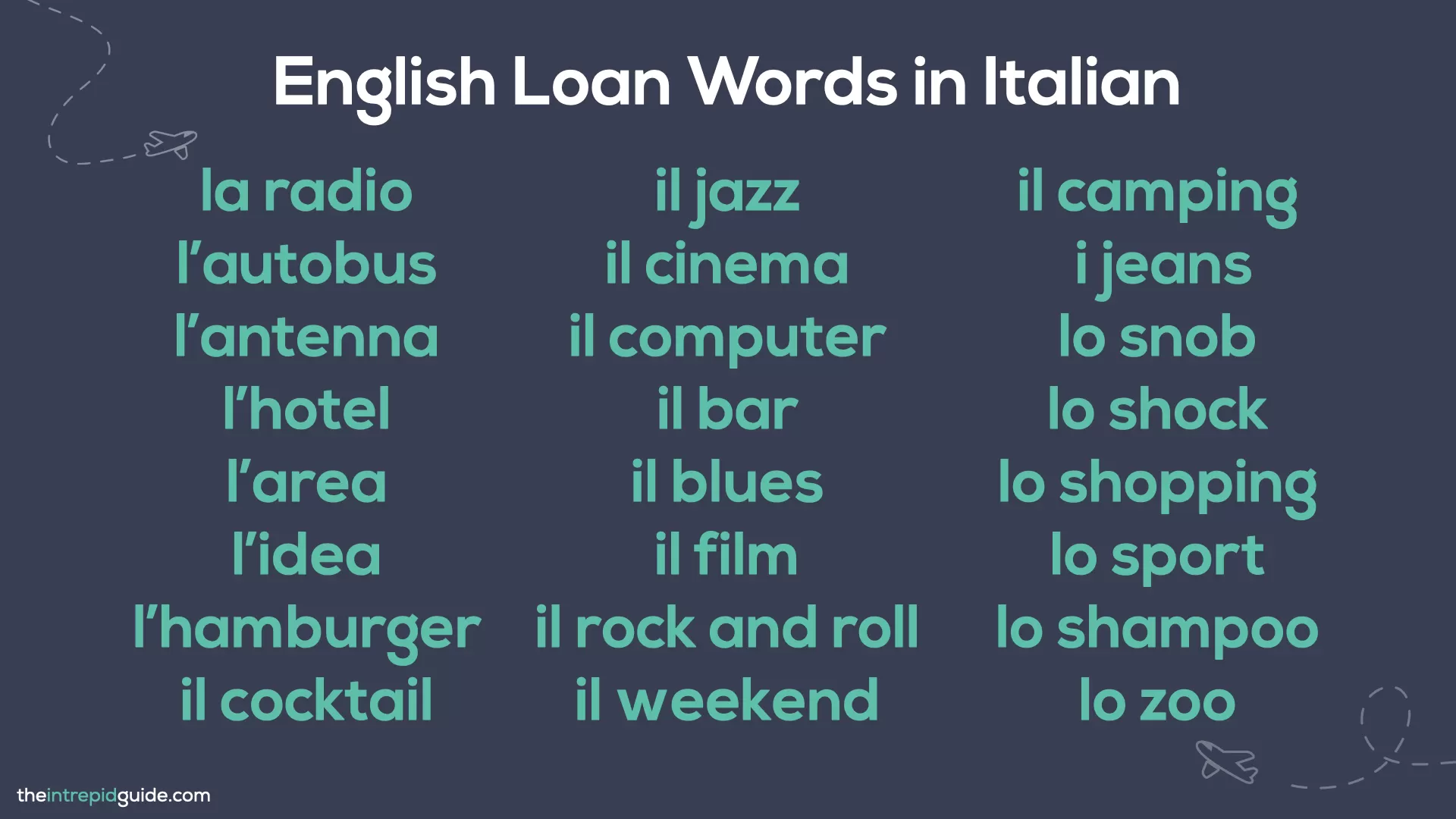
These are only a few of many English words that have entered the Italian language. You can see my complete guide to English words in Italian here. In the same way, many Italian words are used in English-speaking countries too! Including:
- la pizza
- la pasta
- gli spaghetti
- i tortellini
- la mozzarella
- l’espresso
- il cappuccino
- il panino – a sandwich / i panini – sandwiches
- i biscotti – cookies / il biscotto – cookie
- il tiramisù
Incidentally, did you know that tiramisù literally means ‘pull me up’? This refers to the fact that this sweet dessert is made with strong Italian espresso coffee effectively giving you an energy boost or a ‘pick me up’.
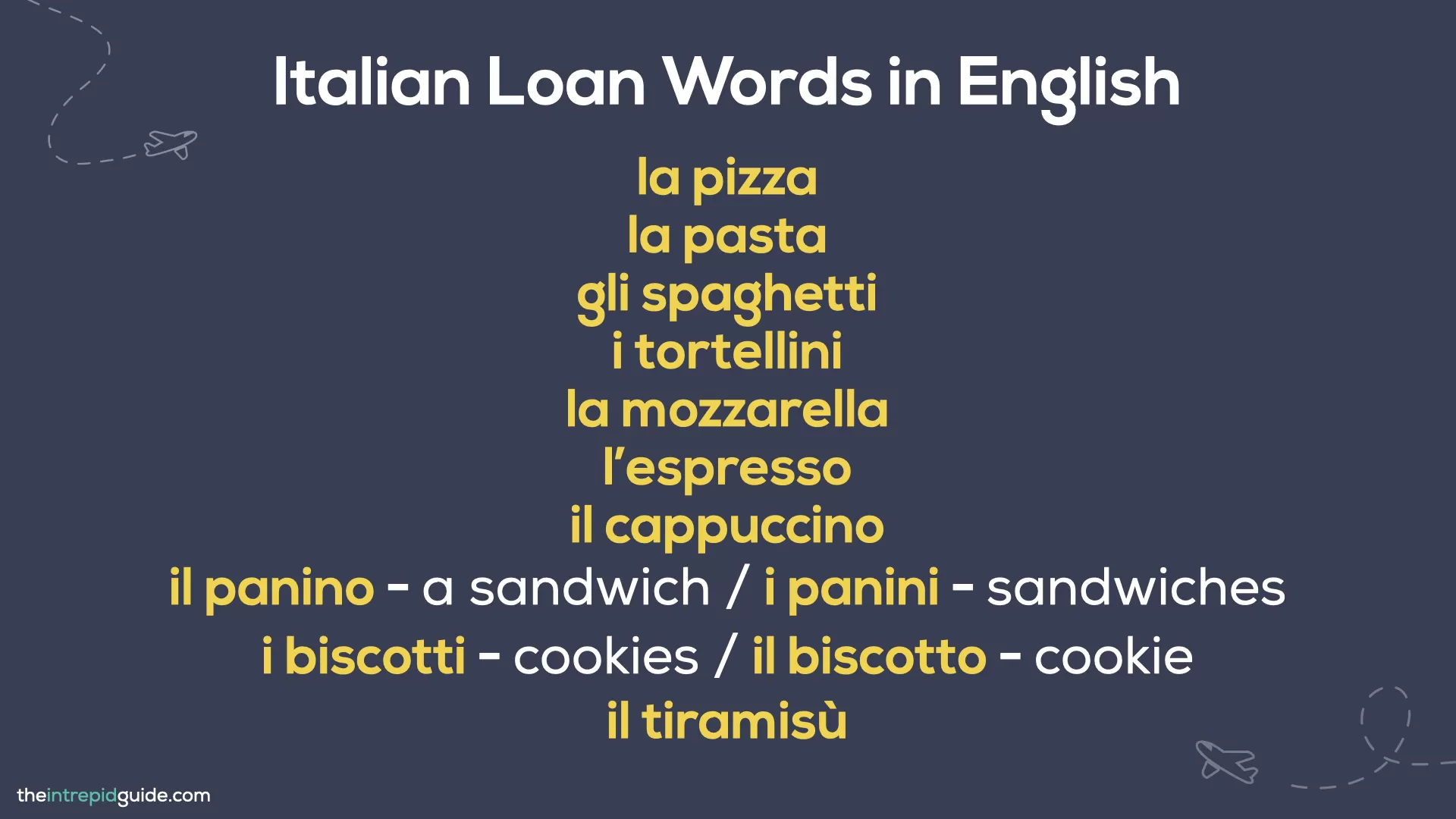
Italian Cognates
In addition to the words that have crept into the language directly, Italian and English have many cognates. A cognate is a word in one language that has the same origin as a word in another one and may sound similar. Here are some examples:
- airport – l’aeroporto
- attention – l’attenzione
- communication – la comunicazione
- important – importante
- incredible – incredibile
Fortunately, there are some rules that you can apply to Italianize words you already know. Here are a few tips that will help you recognize and use Italian cognates.
Italianizing Nouns
Now that we’re starting to look at the grammar, let’s brush up on some grammatical terms. Don’t stress. We’re going to keep this really simple.
Don’t know what a noun is? To identify a noun, ask yourself this easy question. Can I place either ‘the’, ‘a’ or ‘an’ in front of the word? If the answer is yes, then you’ve got yourself a noun!
For example, the word pizza is a noun because when we say ‘a pizza’ or ‘the pizza’ it makes sense. However, saying ‘the delicious’ or ‘a delicious’ on its own doesn’t make sense.
With that in mind, here are a few rules to help build up your vocabulary of nouns.
Rule 1: Nouns in English ending in -y become -ia in Italian
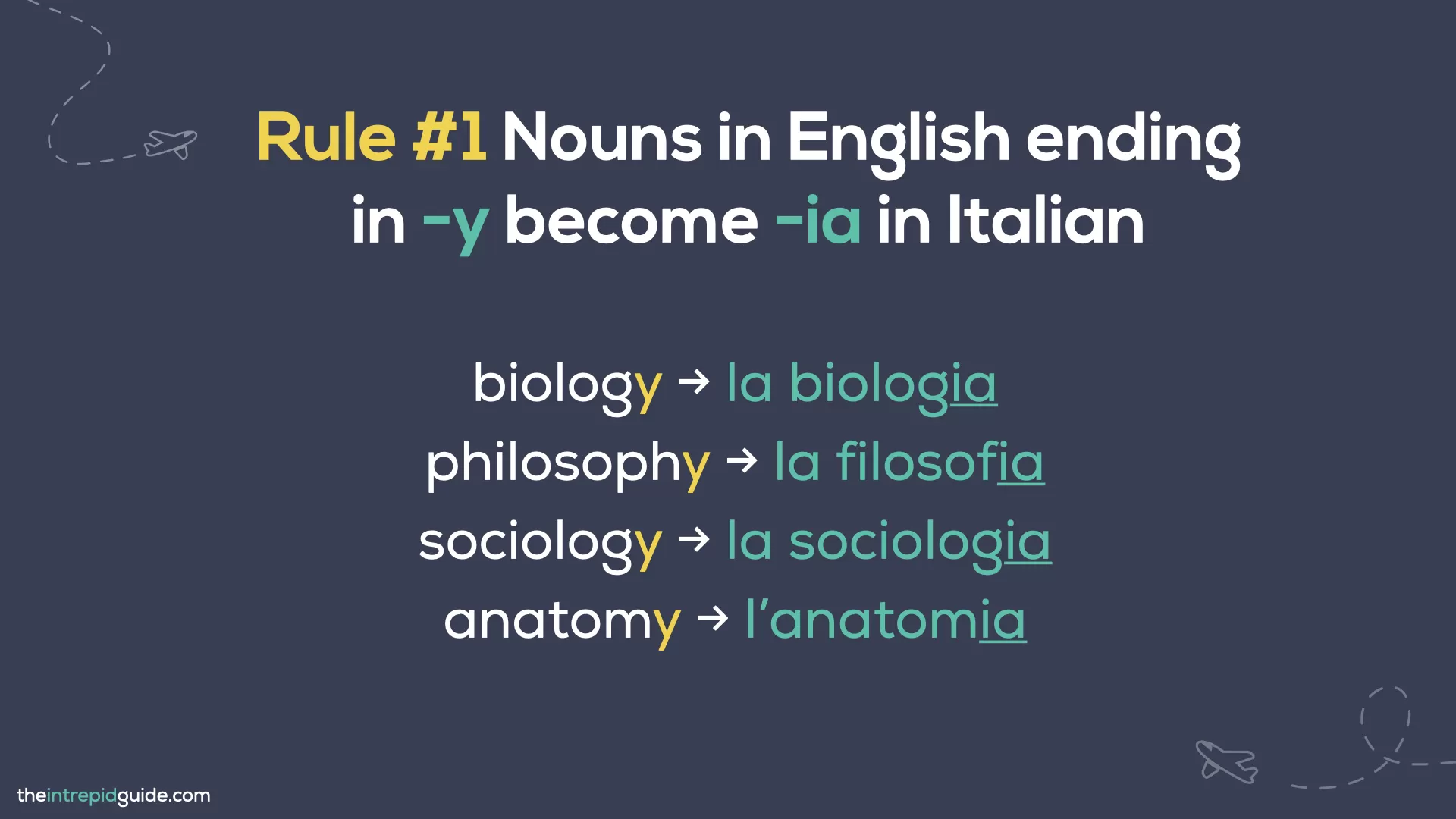
Here are some examples:
- biology – la biologia
- philosophy – la filosofia
- sociology – la sociologia
- anatomy – l’anatomia
Rule 2: Nouns in English ending in -ic(s) become -ica in Italian
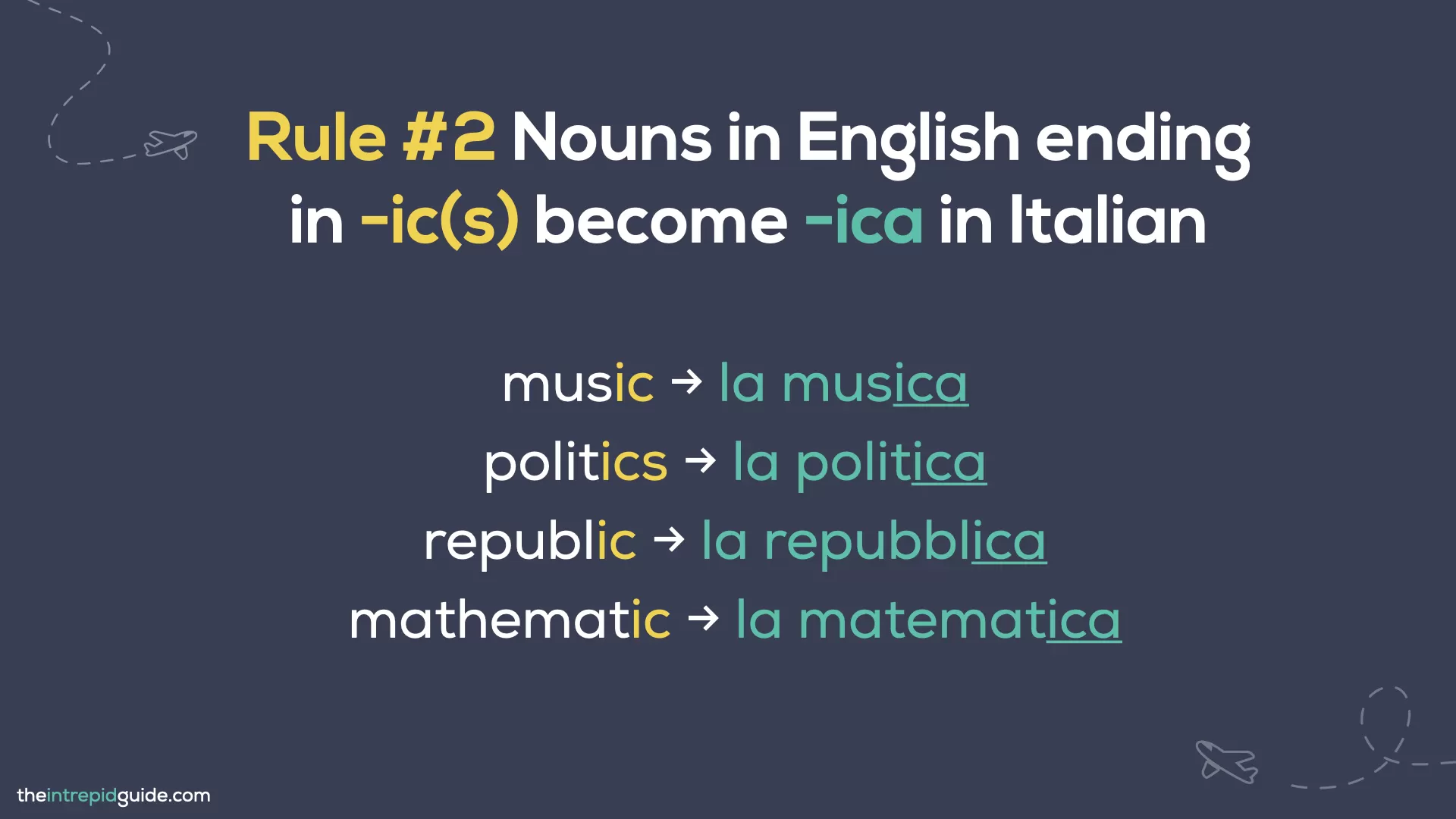 Here are some examples:
Here are some examples:
- music – la musica
- politics – la politica
- republic – la repubblica
- mathematic – la matematica
Rule 3: Nouns in English ending in -ty become -tà in Italian
 Here are some examples:
Here are some examples:
- city – la città
- identity – l’identità
- society – la società
- university – l’università
Rule 4: Nouns in English ending in -ce become -za in Italian
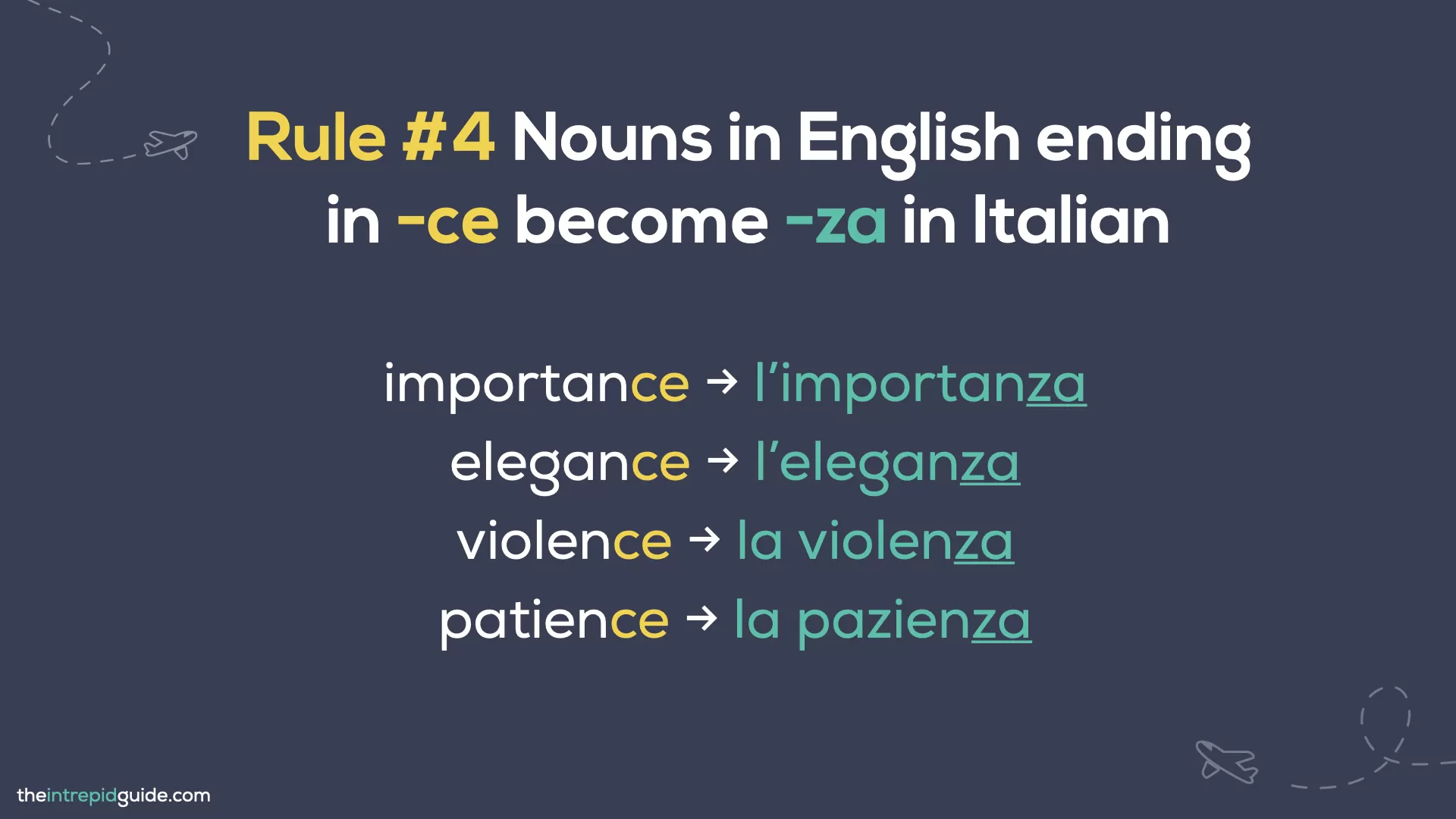 Here are some examples:
Here are some examples:
- importance – l’importanza
- elegance – l’eleganza
- violence – la violenza
- patience – la pazienza
Rule 5: Nouns in English ending in -tion become -zione in Italian
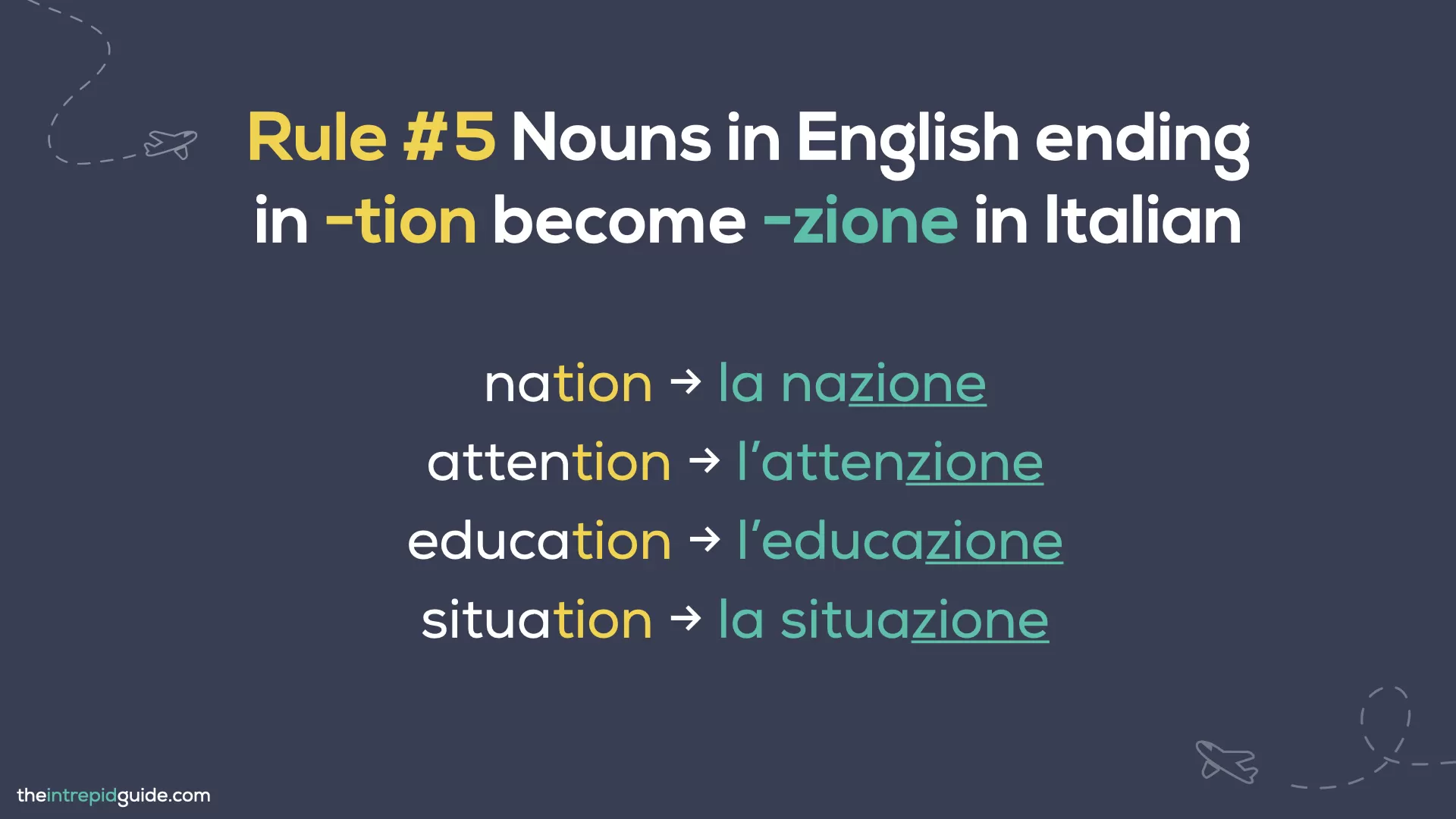 Here are some examples:
Here are some examples:
- nation – la nazione
- attention – l’attenzione
- education – l’educazione
- situation – la situazione
Rule 6: Nouns in English ending in -o(u)r become -ore in Italian
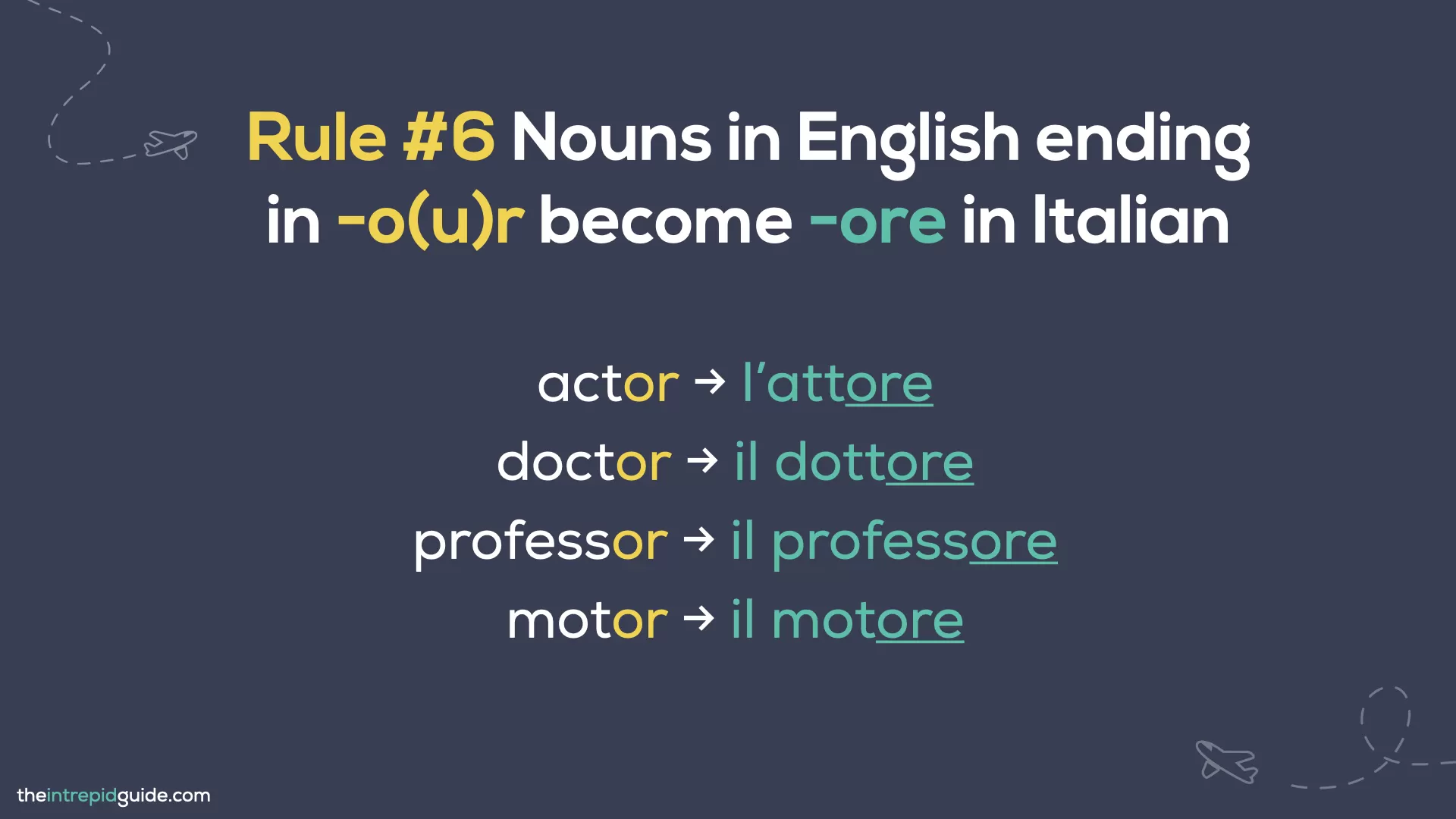 Here are some examples:
Here are some examples:
- actor – l’attore
- doctor – il dottore
- professor – il professore
- motor – il motore
Rule 7: Nouns in English ending in -ary become -ario in Italian
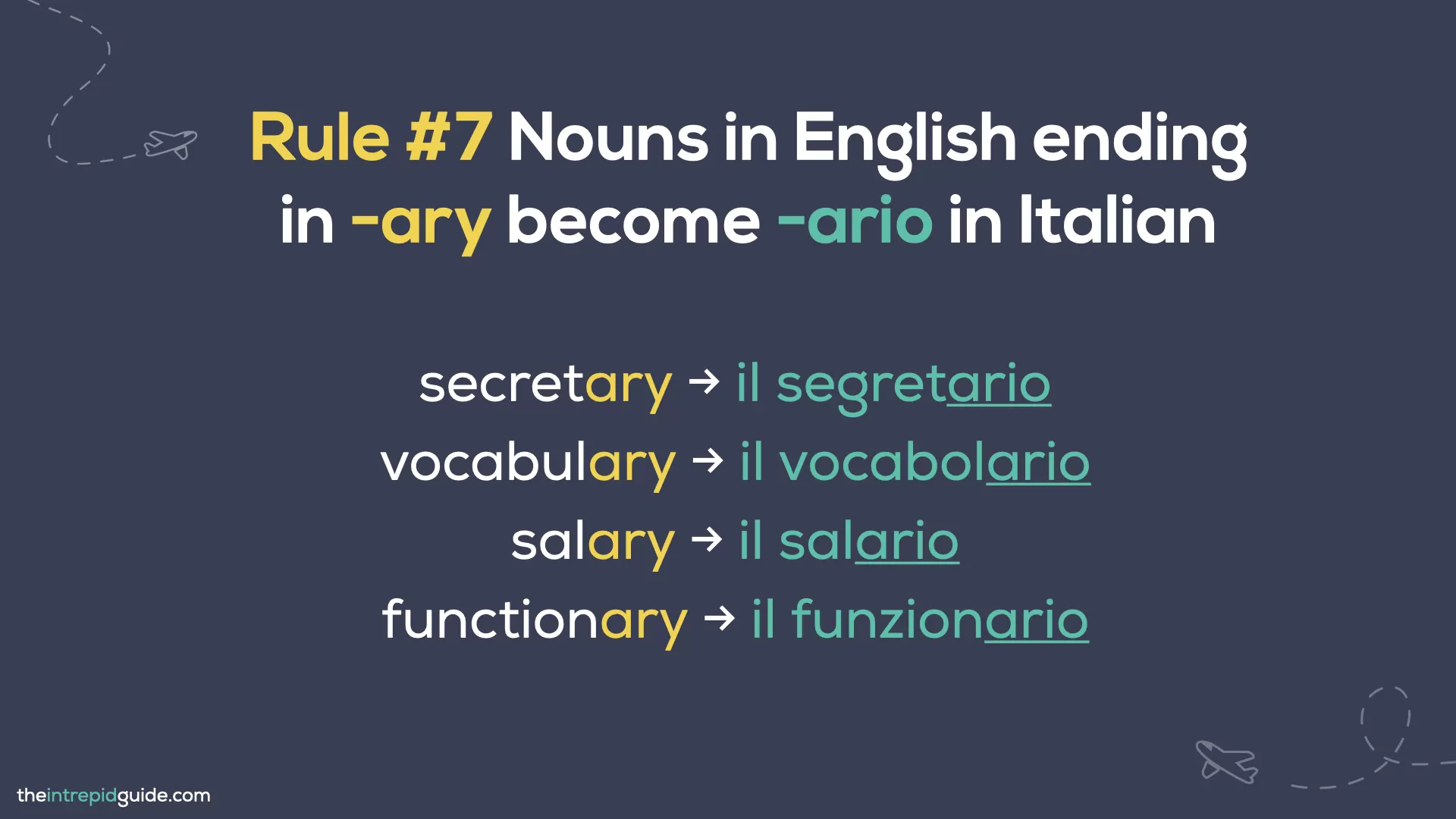 Here are some examples:
Here are some examples:
- secretary – il segretario
- vocabulary – il vocabolario
- salary – il salario
- functionary – il funzionario
Rule 8: Nouns in English ending in -ist become -ista in Italian
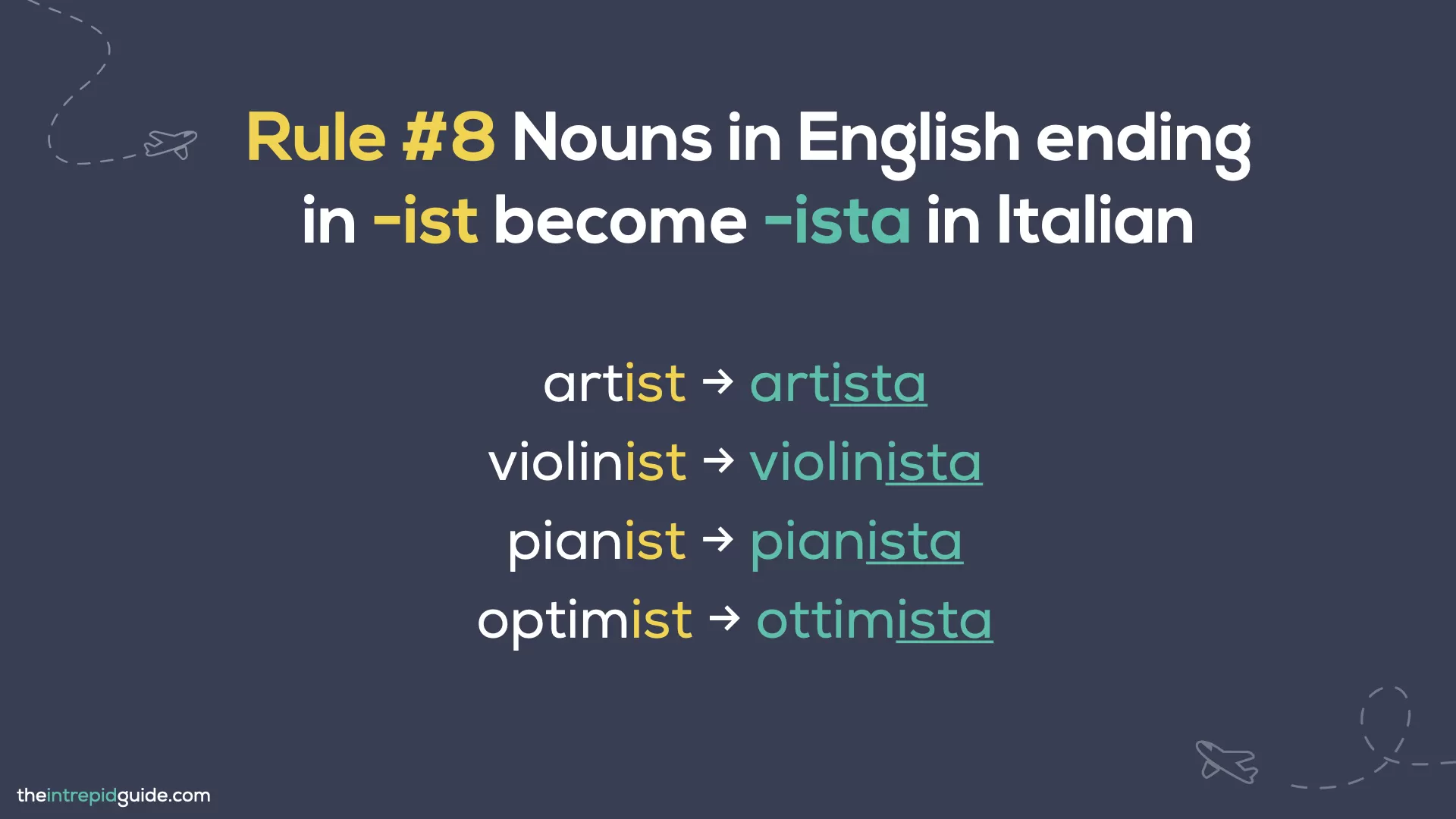 Here are some examples:
Here are some examples:
- artist – artista
- violinist – violinista
- pianist – pianista
- optimist – ottimista
Italianizing Adjectives
Earlier we spoke about nouns in our pizza example. Let’s take this example one step further and add an adjective to it.
Adjectives can be identified by placing ‘is’ in front of a word. For example, ‘the pizza is delicious’, or ‘the coffee is hot’.
Here are some rules to help you build up your vocabulary of adjectives.
Rule 9: Adjectives in English ending in -al become -ale in Italian
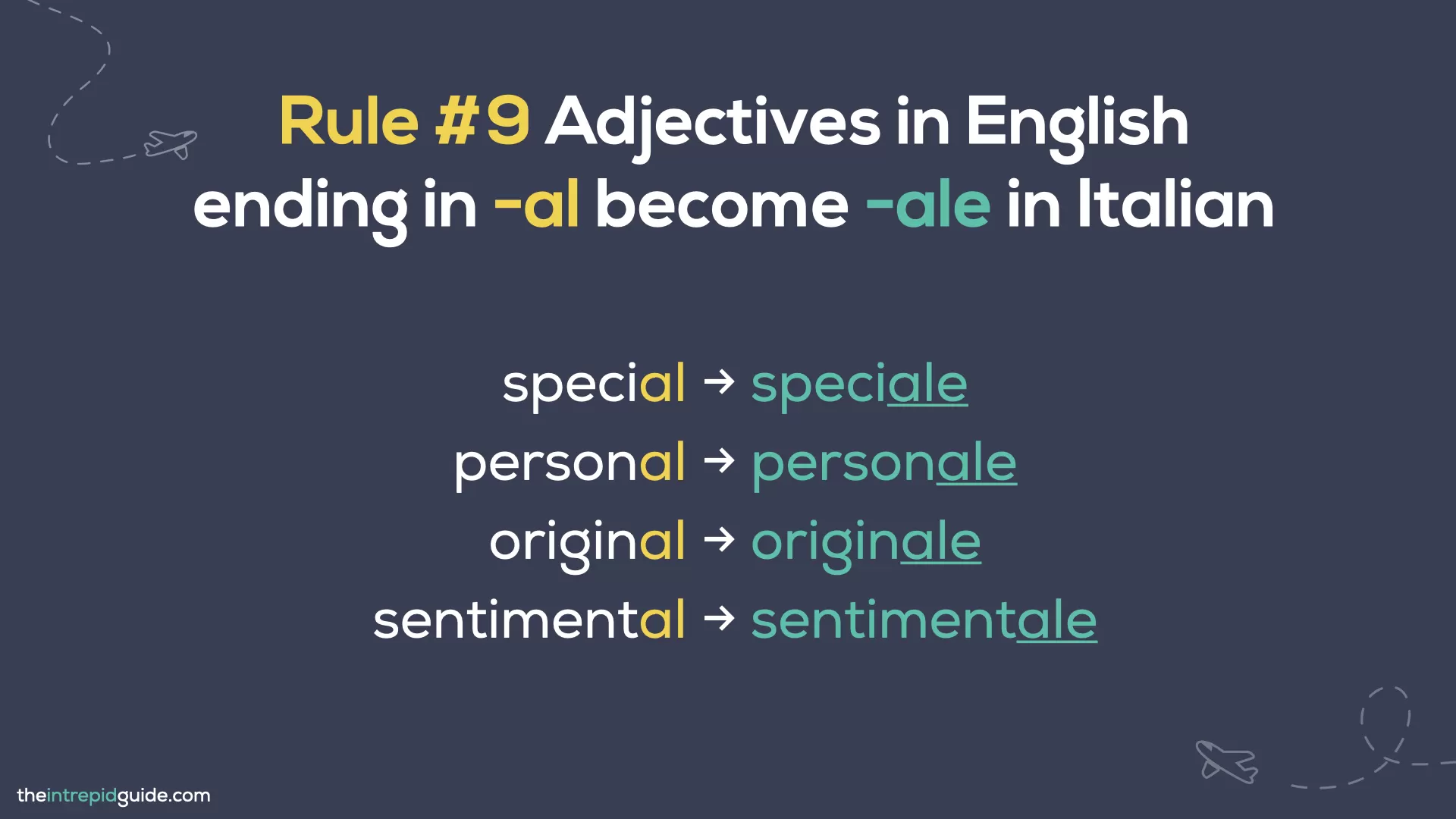 Here are some examples:
Here are some examples:
- special – speciale
- personal – personale
- original – originale
- sentimental – sentimentale
Rule 10: Adjectives in English ending in -ect become -etto in Italian
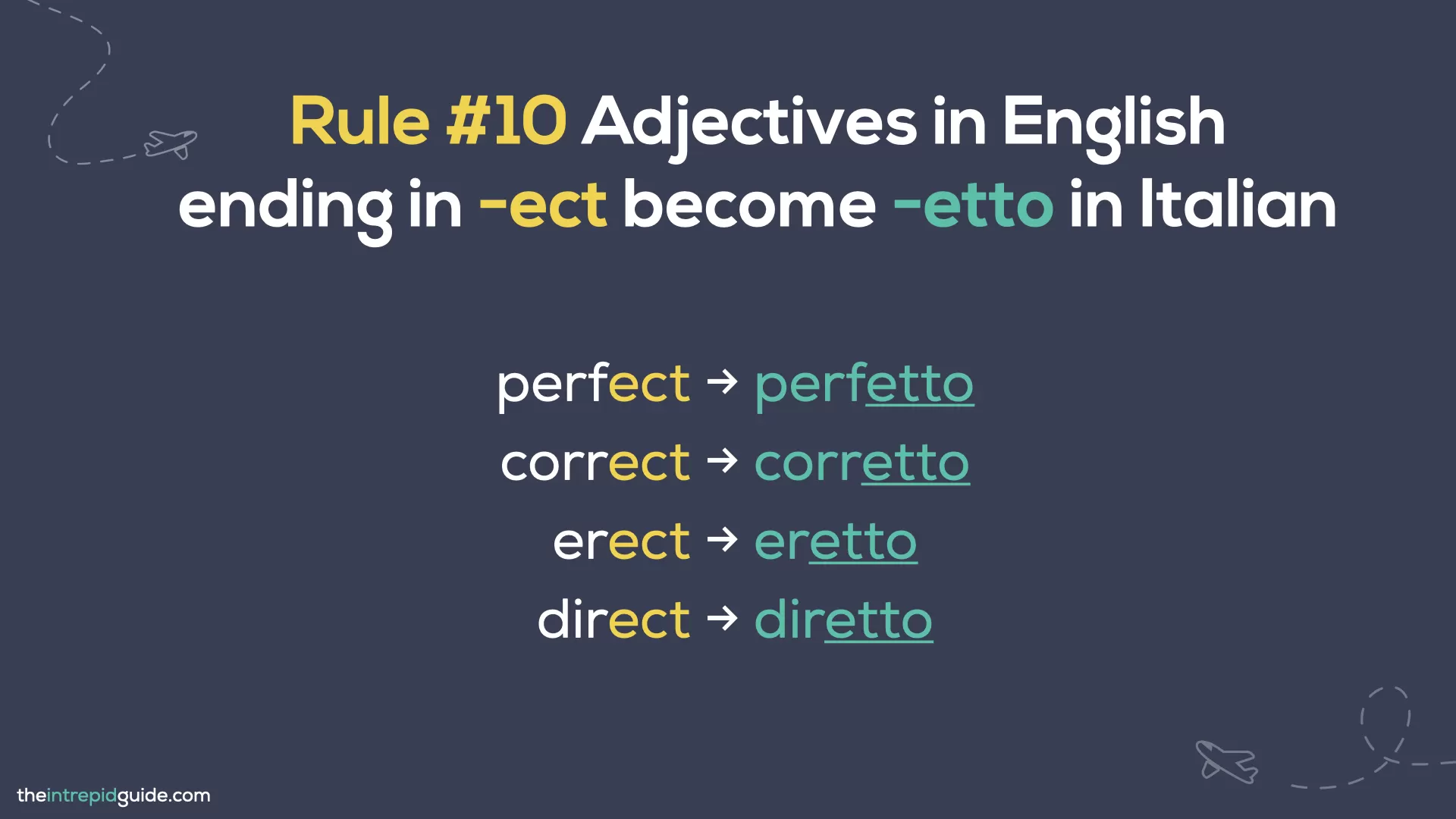 Here are some examples:
Here are some examples:
- perfect – perfetto
- correct – corretto
- erect – eretto
- direct – diretto
Rule 11: Adjectives in English ending in -ical become -ico in Italian
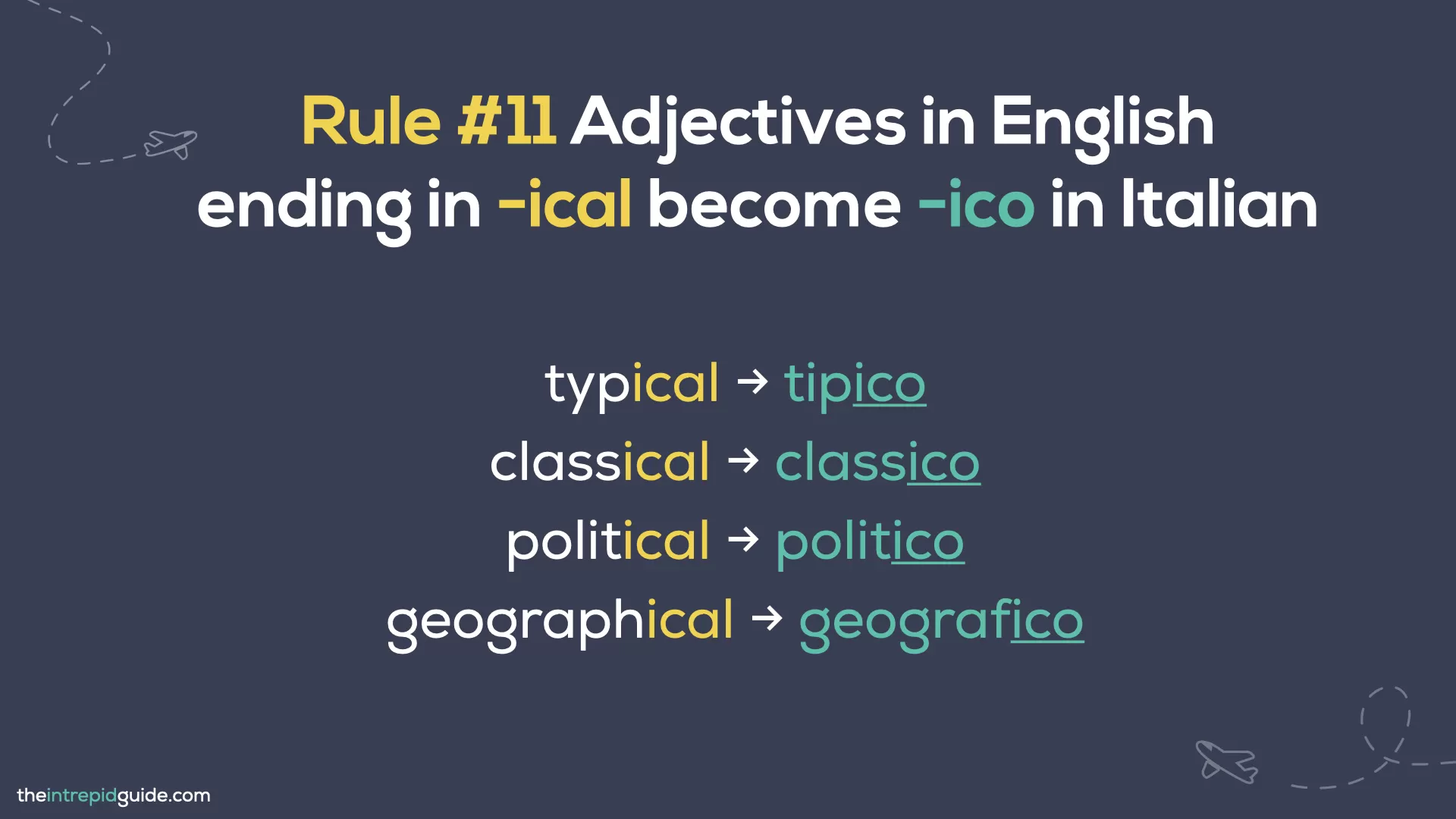 Here are some examples:
Here are some examples:
- typical – tipico
- classical – classico
- political – politico
- geographical – geografico
Rule 12: Adjectives in English ending in -ous become -oso in Italian
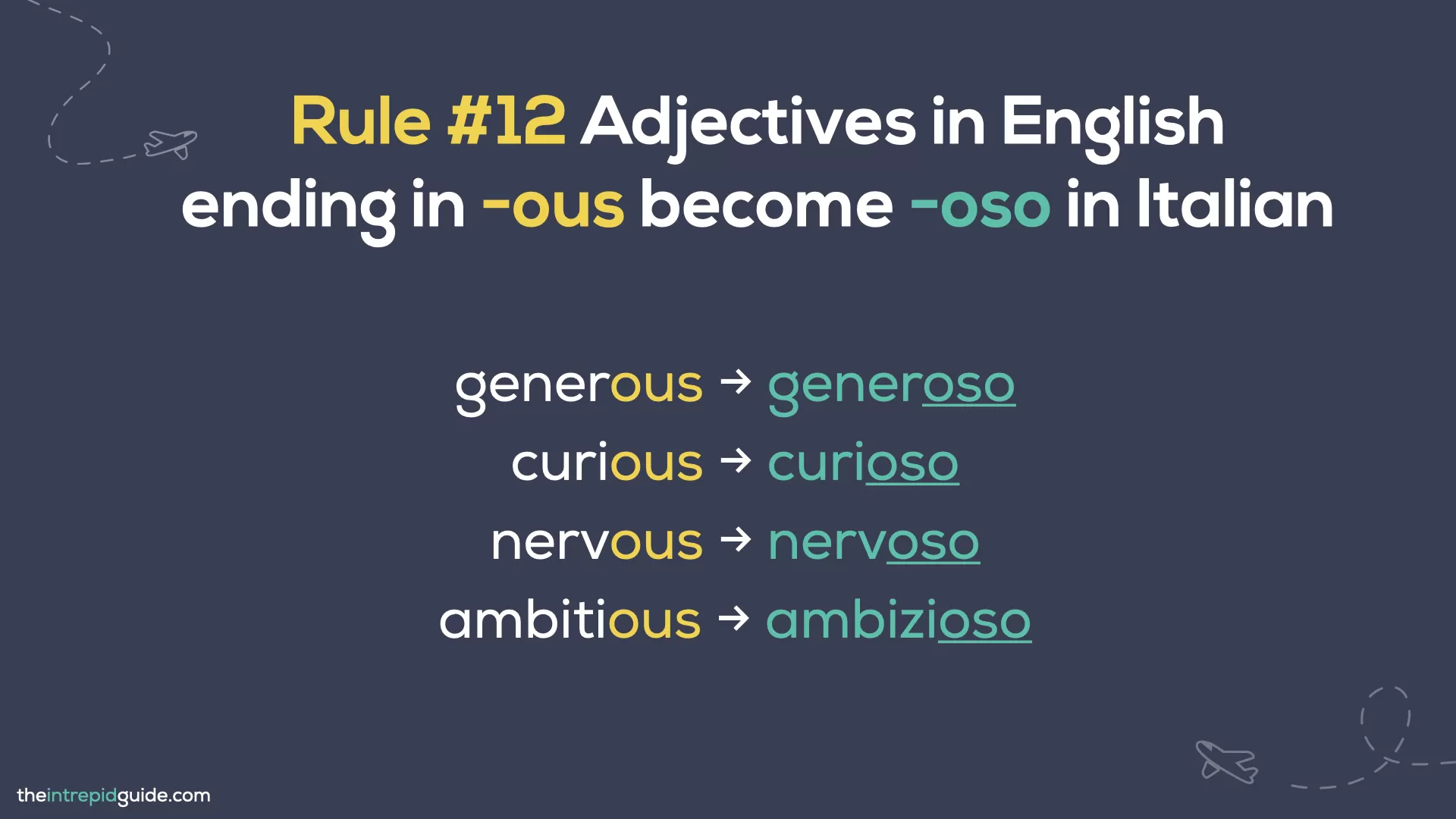 Here are some examples:
Here are some examples:
- generous – generoso
- curious – curioso
- nervous – nervoso
- ambitious – ambizioso
Rule 13: Adjectives in English ending in -able or -ible become -abile and -ibile in Italian
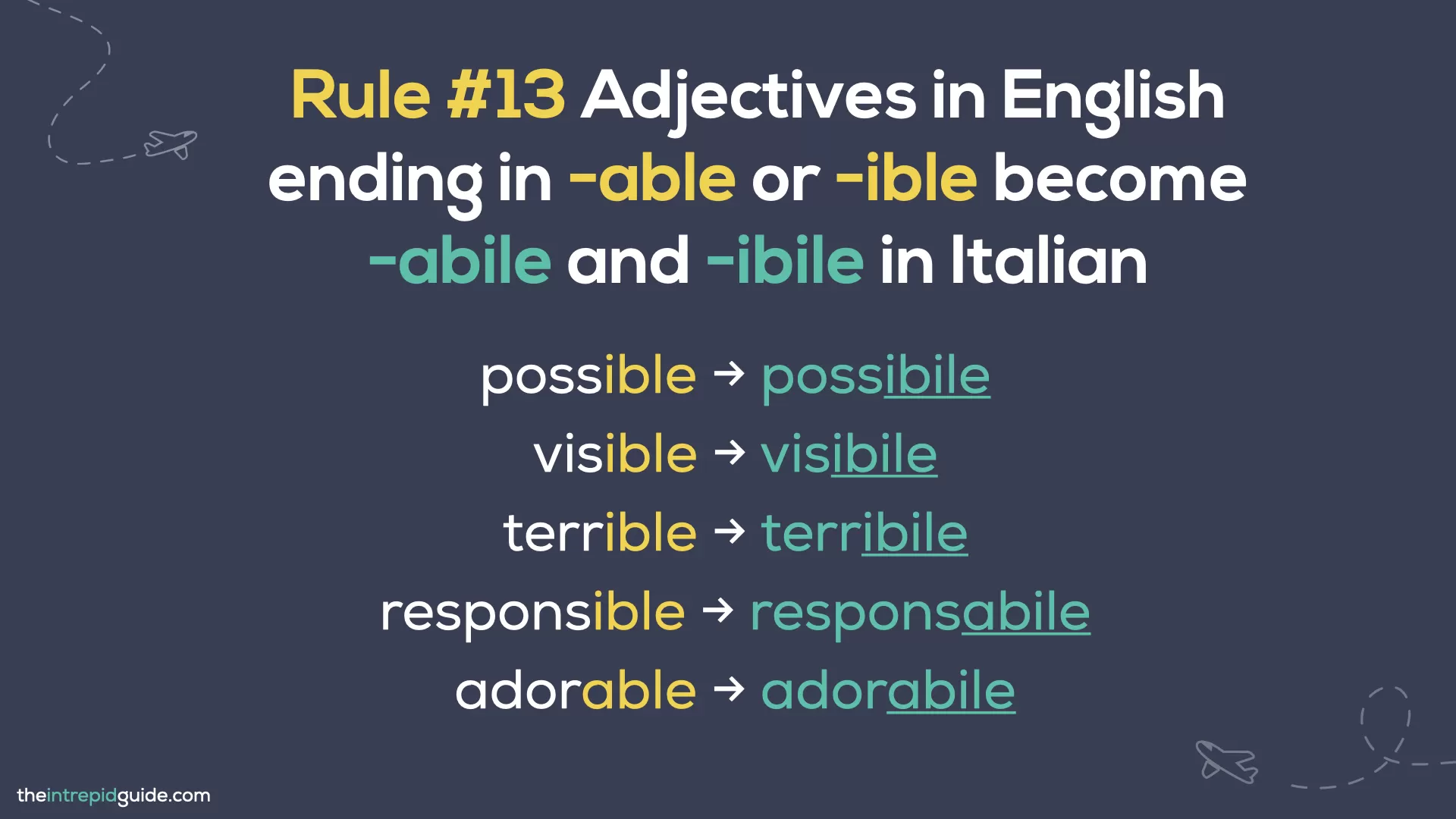 Here are some examples:
Here are some examples:
- possible – possibile
- visible – visibile
- terrible – terribile
- responsible – responsabile
- adorable – adorabile
Italianizing Verbs
Last but not least, we have the all-important verbs. Verbs form the backbone of any language. This term alone might induce fear but just as we’ve done before we are going to keep things really simple.
A verb can be identified by adding ‘to’ in front of a word. For example, to do, to eat, to cook, to travel. These are all verbs. It’s that easy! It’s important that you recognise verbs as they will help you form sentences with ease.
It’s worth noting that In Italian, the ‘to’ part of any verb is already included as part of the word and is identified by the last three letters. There are only three different verb endings, they are:
- -ere
- -ire
- -are
For example, the verb for to eat is mangiare, therefore the ‘to’ part is the -are ending. You’ll be able to identify these endings in the following rules.
Rule 14: Verbs in English ending in -cate become -care in Italian.
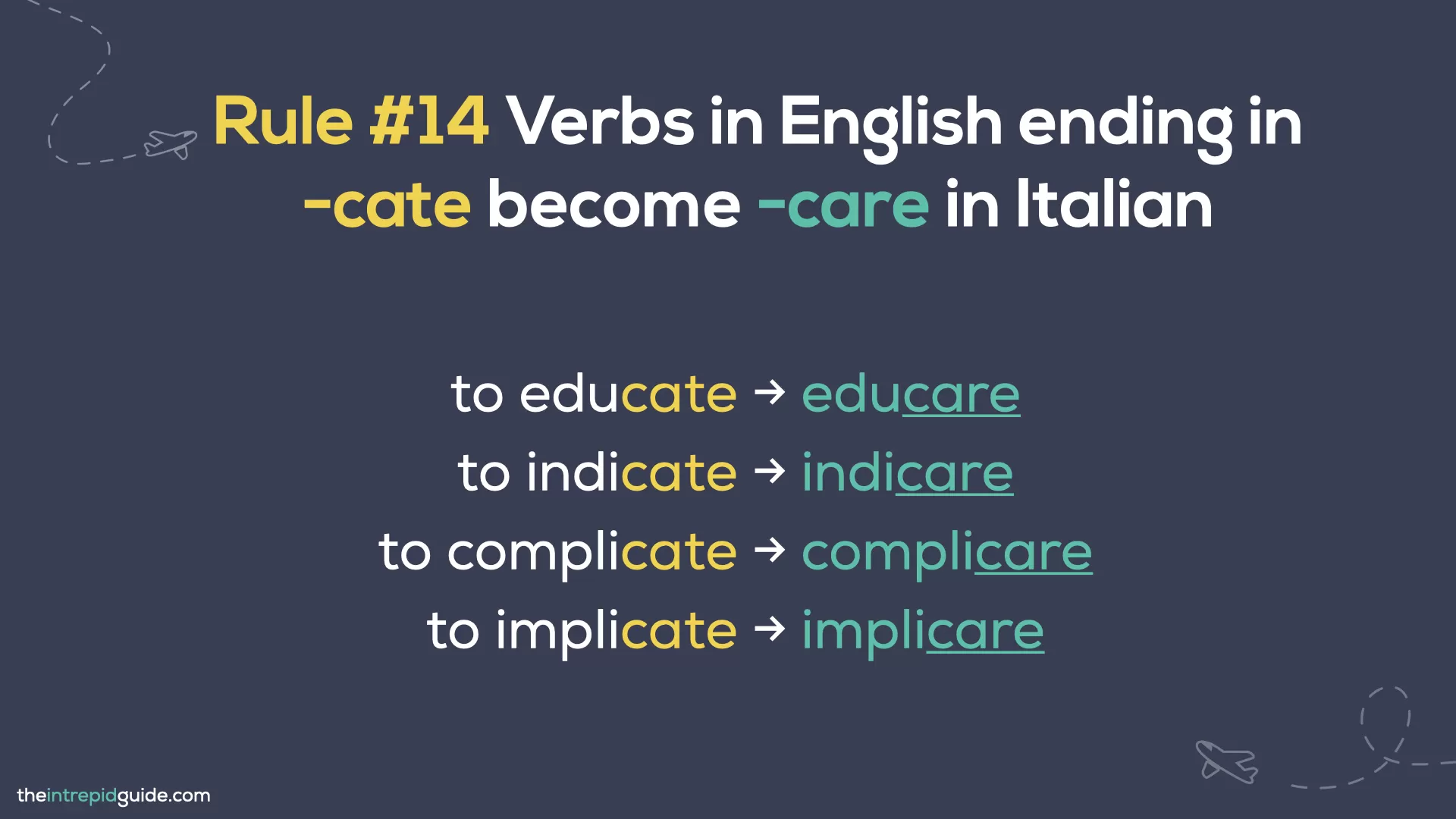 Here are some examples:
Here are some examples:
- to educate – educare
- to indicate – indicare
- to complicate – complicare
- to imply, implicate – implicare
Rule 15: Verbs in English ending in -ize(-ise) or -yze(-yse) become -izzare in Italian
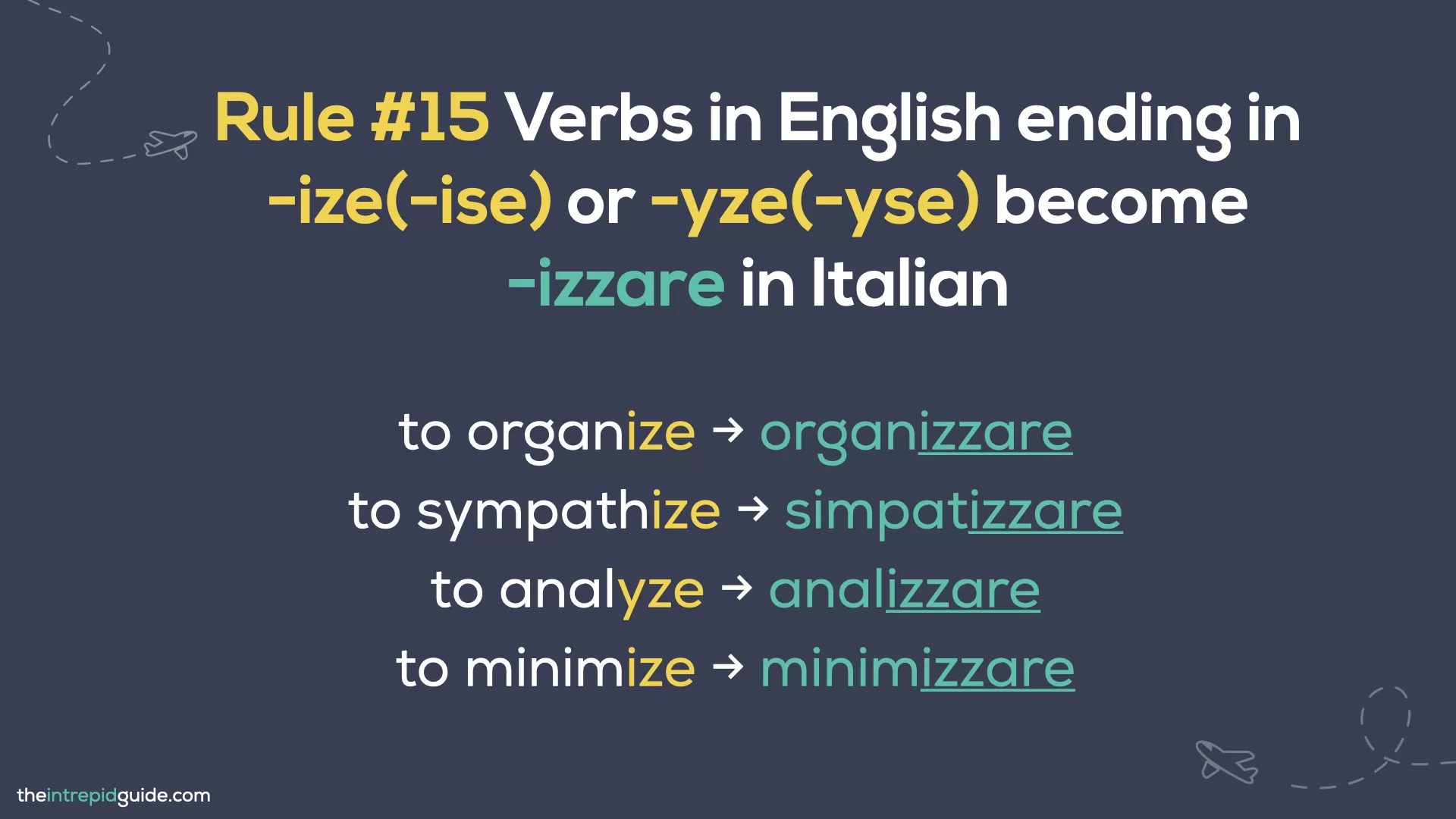 Here are some examples:
Here are some examples:
- to organize – organizzare
- to sympathize – simpatizzare
- to analyze – analizzare
- to minimize – minimizzare
Rule 16: Verbs in English ending in -ish become -ire in Italian
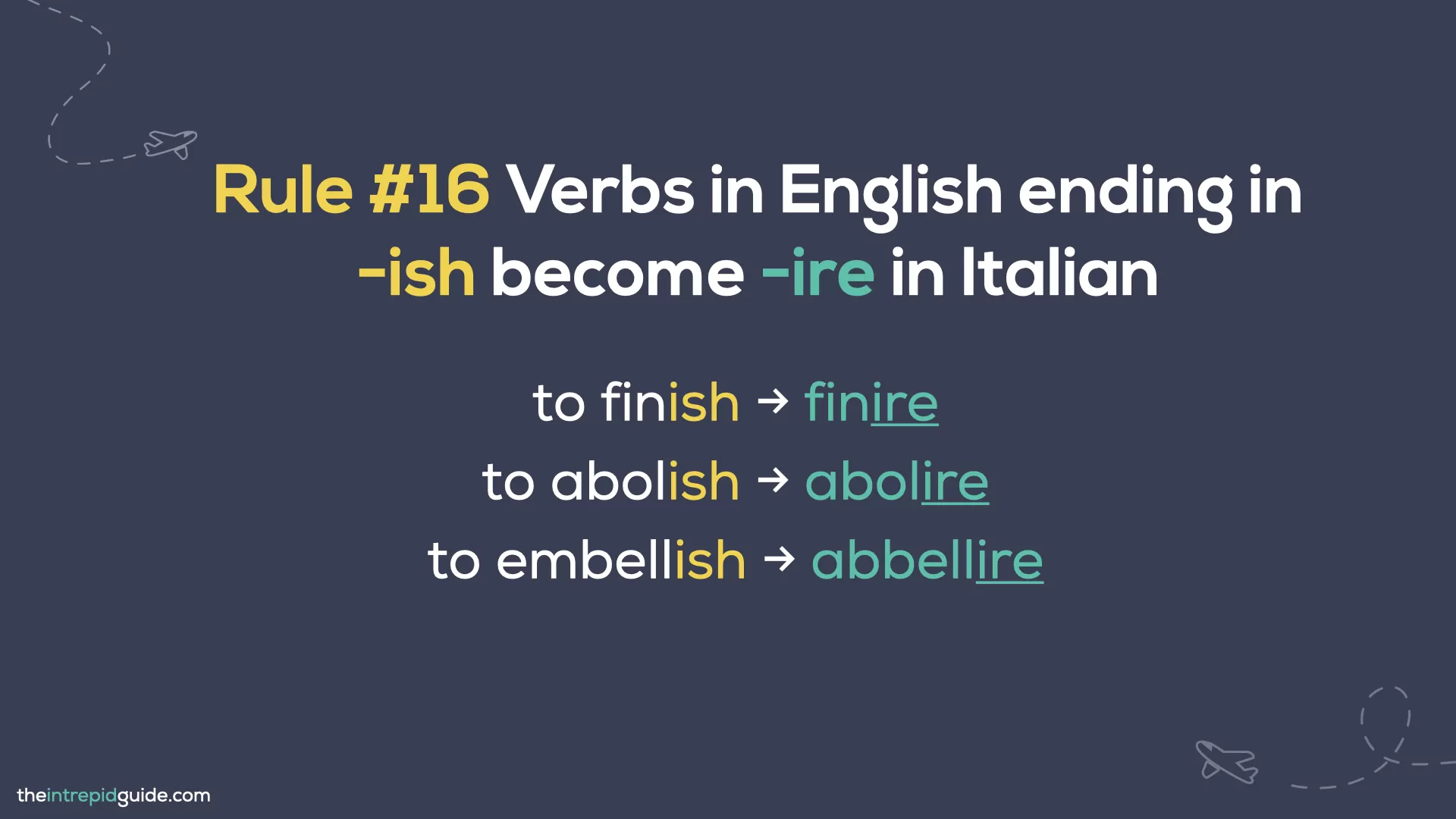 Here are some examples:
Here are some examples:
- to finish – finire
- to abolish – abolire
- to embellish – abbellire
- to establish – stabilire
Download your guide to the 24 most common Italian verbs and learn how to conjugate them in 3 simple steps.
Italianizing Adverbs
Kindly, slowly, here, often, and very are all examples of adverbs. Adverbs modify verbs, adjectives, or other adverbs. By modify we mean to add to or change the meaning of a word.
In the following examples, the adverb is in bold and the verb that it modifies is in italics.
- John speaks loudly. (How does John speak?)
- Afterwards she smoked a cigarette. (When did she smoke?)
- Mary lives locally. (Where does Mary live?)
But adverbs can also modify adjectives. Look at these examples:
Modify an adjective:
- He is really handsome. (How handsome is he?)
- That was extremely kind of you.
Modify another adverb:
- She drives incredibly slowly. (How slowly does she drive?)
- He drives extremely fast.
Now that we know what an adverb is, let’s look at the next set of rules.
Rule 17: Adverbs in English ending in -ably and -ibly become –abilmente and -ibilmente respectively, in Italian
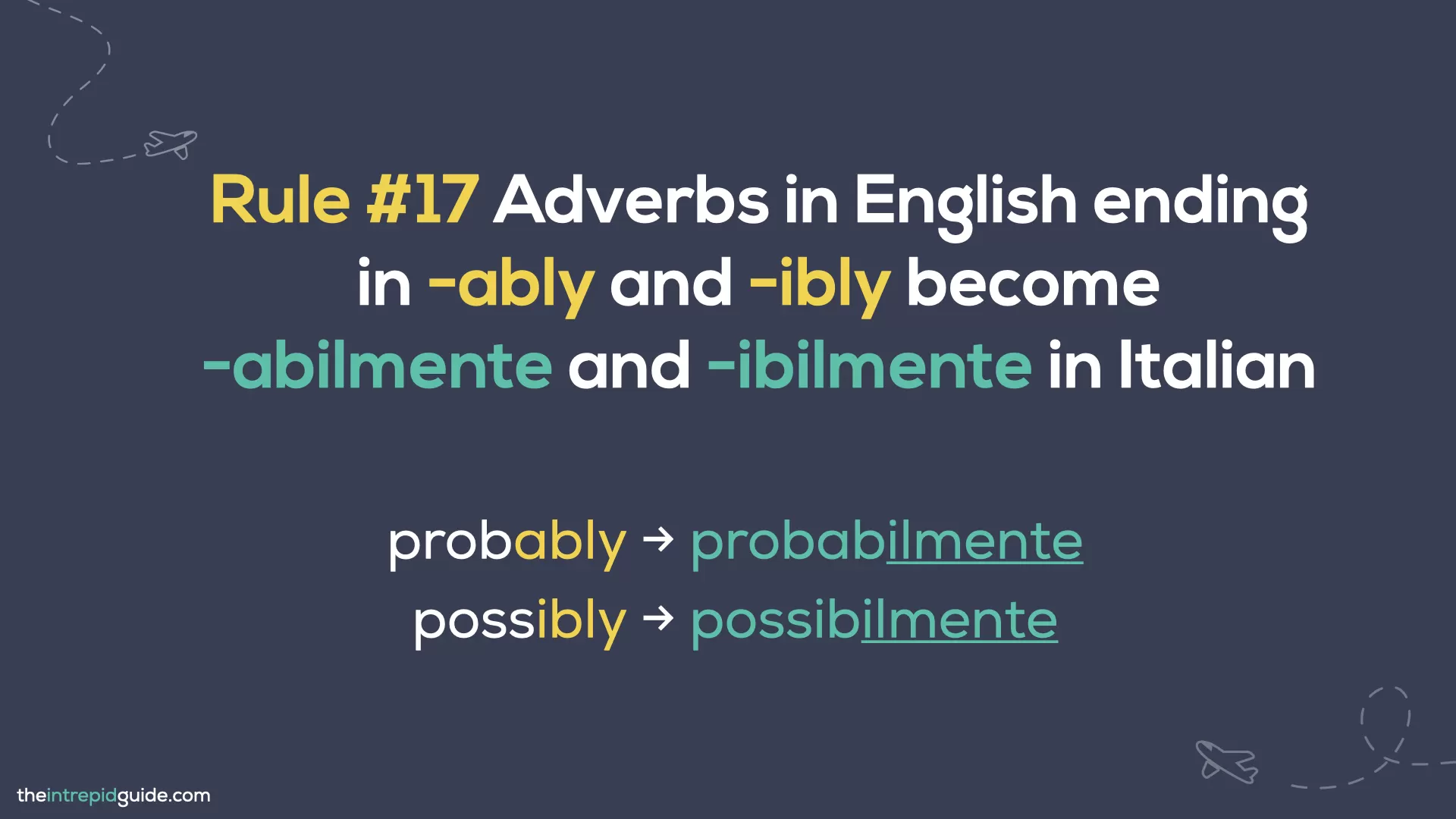 Here are some examples:
Here are some examples:
- probably – probabilmente
- possibly – possibilmente
As you build up your vocabulary and don’t yet know the word for something, it’s ok to Italianize the English word using these 17 rules. Of course, there are some exceptions to these rules, but you’d be surprised how often they apply! As with everything, you learn by experience. Which rule/s surprised you the most? Let me know in the comments below.
 Enjoyed this lesson? Are you a beginner or an intermediate Italian learner? Got a trip coming up or want to communicate with your Italian partner or relatives in Italian? Learn Italian with my unique 80/20 method
Enjoyed this lesson? Are you a beginner or an intermediate Italian learner? Got a trip coming up or want to communicate with your Italian partner or relatives in Italian? Learn Italian with my unique 80/20 method
Registrations are now open to join Intrepid Italian, my new series of online video courses that use my unique 80/20 method. You’ll go from a shy, confused beginner to a proficient and confident intermediate speaker, with me as your trusty guide.
You’ll finally be able to connect with your Italian partner, speak to your relatives and enjoy authentic travel experiences in Italy that you’ve always dreamed of, and so much more.
As a native English speaker who learned Italian as an adult, I know what it’s like to feel hopeless and lack the confidence to speak. I know what it’s like to start from scratch and to even go back to absolute basics and learn what a verb is!
Intrepid Italian was created with YOU in mind. I use my working knowledge of the English language to help you get into the ‘Italian mindset’ so you can avoid the common pitfalls and errors English speakers make – because I made them once too! I break everything down in such a way that it ‘clicks’ and just makes sense.
No matter what your level is, there is an Intrepid Italian course for you, including:
- 🇮🇹 Intrepid Italian for Beginners (A1)
- 🇮🇹 Intrepid Italian for Advanced Beginners (A2)
- 🇮🇹 Intrepid Italian for Intermediates (B1)
You can join 1, 2, or all 3 courses, it’s entirely up to you. The best part is that you have lifetime access so you learn anytime, anywhere and on any device.
As your guide, I walk you through each lesson, step-by-step, using my unique 80/20 method. My approach is different from traditional methods because I teach you the most important 20% of the language right from the beginning so you can start to speak straight away.
Each course includes video lessons, audio exercises, downloadable worksheets, bonus guides, a private support community, and lifetime access all designed to streamline your learning while having fun.
It even comes with my famous “Celebrate with a Spritz Guarantee”. After 30 days of using Intrepid Italian, if you don’t want to celebrate your newfound Italian skills with an Aperol Spritz, you don’t have to pay a penny! Cheers! 🥂
Join Intrepid Italian here and start learning today!
Ci vediamo lì! (See you there!)
Learning Italian? Check out these Italian language guides
- Italian for Beginners | How to Learn Italian in 3 Simple Steps
- Ultimate Guide to the Italian Alphabet: Letters, Pronunciation, and Stress
- TOP 100 Most Common Italian Words (Plus PDF Cheat-Sheet & Quiz)
- How to say ‘Merry Christmas’ in Italian [Plus New Year Vocabulary and Quiz]
- 34 Words That Don’t Exist in Italian (English Loanwords in Italian)
- Italian Culture: 19 Weird Things Italians Do That No One Warns You About
- 17 Weird Italian Superstitions Italians ACTUALLY Live By
- 17 Must-Know Italian Hand Gestures: The Ultimate Guide
- Top 24 Most Important Verbs in Italian (Plus PDF Cheat-Sheet & Quiz)
- 10 Ways Natives REALLY Say ‘You’re Welcome’ in Italian
- How to say ‘Please’ in Italian in 9 Ways Like a Native
- 41 Italian Greetings: How to Say ‘Hello’ in Italian Like a Local
- 125 Most Common Italian Phrases for Travel You’ll Ever Need [PLUS Printable]
- 8 DEADLY mistakes in Italian (& How to Avoid Them)
- How to Conjugate Italian Verbs in 3 Simple Steps [Italian for Beginners]
- Is Italian Hard to Learn? 7 Common Mistakes & How to Avoid Them
- Master Days of the Week in Italian (7 Simple Memory Hacks)
- Italian Numbers: How to Count in Italian From 0 to 1 Billion (Plus PDF Download)
- How to Order Food & Drinks in Italian [Italian for Beginners]
- 15 Italian Words You Should NEVER Mispronounce [& How Not To]
- 11 Effective Hacks That’ll Help You Learn Italian So Much Faster
- Top 14 Italian Words You Should NEVER Say [& What to Use Instead]
- 20 Hilarious Everyday Italian Expressions You Should Use
- Romanesco: 25 Cool Roman Dialect Words You Should Use in Rome
- 10 Reasons Why Learning Italian Will Change Your Life
- 10 Italian Expressions Italians Love Saying
- 10 Italian Phrases That Will Instantly Make You Sound more Italian
- Funny Italian Sayings: 26 Food-Related Insults You Won’t Forget
- 15 Romantic Italian Films That’ll Make You Love Italy Even More
- How to Master Common Italian Phrases for Travel (Like a Local!)
Like it? Pin it for later!

Over to you!
Did you find this guide helpful? Got a question? Let me know using the comments section below or join me on social media @intrepidguide or @intrepiditalian to start a conversation.
Thanks for reading and I hope you enjoyed this post.
Like what you see? Subscribe using the form below to have all of my posts delivered directly to your email.

